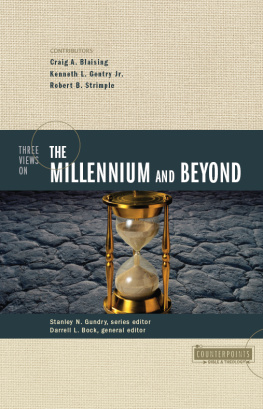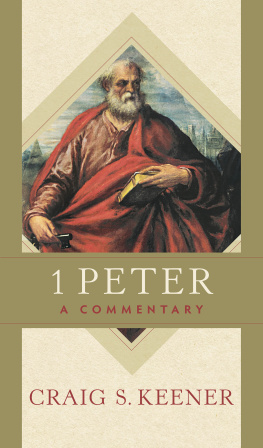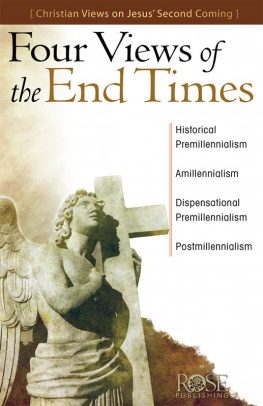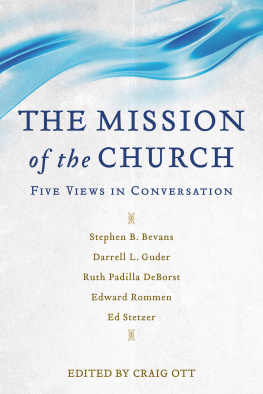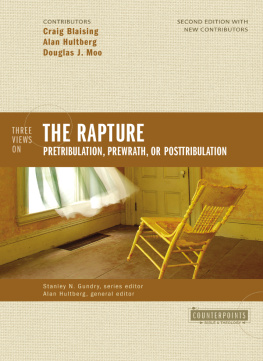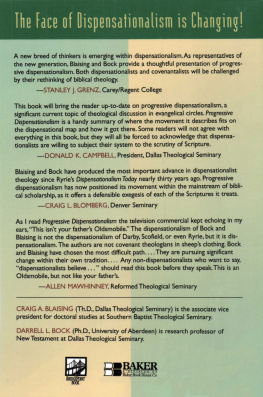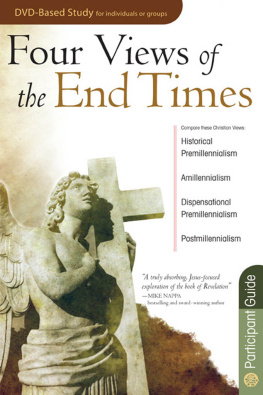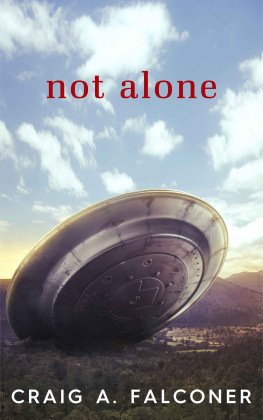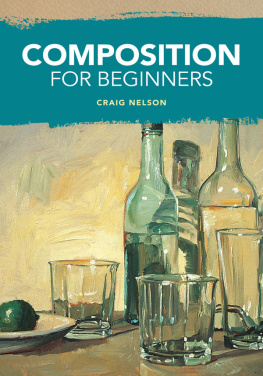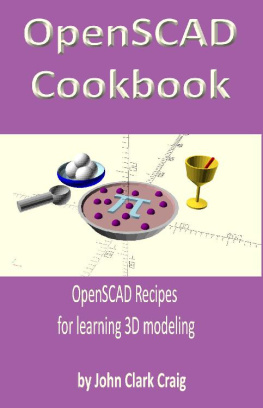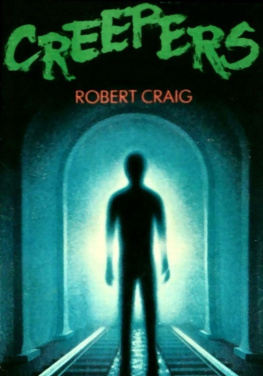Blaising Craig A. - Three Views on the Millennium and Beyond
Here you can read online Blaising Craig A. - Three Views on the Millennium and Beyond full text of the book (entire story) in english for free. Download pdf and epub, get meaning, cover and reviews about this ebook. City: Grand Rapids;Mich, year: 2010, publisher: Zondervan, genre: Religion. Description of the work, (preface) as well as reviews are available. Best literature library LitArk.com created for fans of good reading and offers a wide selection of genres:
Romance novel
Science fiction
Adventure
Detective
Science
History
Home and family
Prose
Art
Politics
Computer
Non-fiction
Religion
Business
Children
Humor
Choose a favorite category and find really read worthwhile books. Enjoy immersion in the world of imagination, feel the emotions of the characters or learn something new for yourself, make an fascinating discovery.
- Book:Three Views on the Millennium and Beyond
- Author:
- Publisher:Zondervan
- Genre:
- Year:2010
- City:Grand Rapids;Mich
- Rating:5 / 5
- Favourites:Add to favourites
- Your mark:
- 100
- 1
- 2
- 3
- 4
- 5
Three Views on the Millennium and Beyond: summary, description and annotation
We offer to read an annotation, description, summary or preface (depends on what the author of the book "Three Views on the Millennium and Beyond" wrote himself). If you haven't found the necessary information about the book — write in the comments, we will try to find it.
Three Views on the Millennium and Beyond — read online for free the complete book (whole text) full work
Below is the text of the book, divided by pages. System saving the place of the last page read, allows you to conveniently read the book "Three Views on the Millennium and Beyond" online for free, without having to search again every time where you left off. Put a bookmark, and you can go to the page where you finished reading at any time.
Font size:
Interval:
Bookmark:
It is my pleasure to welcome the reader to what I believe is an unprecedented study of the issue of eschatology as it addresses our future. I know of no other recent work where proponents of the three major millennial schools are brought together for an interactive presentation of their views in an irenic environment.
Eschatology is the study of the last things. For some that means future things only, but all of these authors note that we already live in an era of initial fulfillment of promises concerning the Messiah Jesus. We are in a world where eschatology is now at work.
This book picks up the eschatological discussion by treating the question of the Millennium and beyond. This question concerns whether or not there is a future intermediate earthly kingdom of a literal thousand years over which Christ will rule before the new heavens and new earth are established. It is also called chiliasm. Those who argue that Christ comes again before such a kingdom are called premillennialists. Those who argue that the present church age represents that intermediate kingdom come in two types. Postmillennialists see the church as moving toward the complete fulfillment of kingdom promise, which gradually moves to victory until Christ appears. Amillennialists argue that there is no future literal Millennium, but when Christ returns we are ushered immediately into a new heaven and new earth. Nevertheless, postmillennialists are not the same as amillennialists. Postmillennialists see the church as marching gradually but most certainly to victory in the present age, while amillennialists see the church as delivered from the pressures and persecutions of a fallen world when Jesus returns.
All of these views have various subcategories, as our contributors will note, but their basic responsibility is to trace the hermeneutical, theological, and exegetical rationale for their millennial view. Each has also been asked to provide a brief history of his view.
Since the focal point of this book is the issue of the Millennium and beyond, certain questions often given prominence in books on end-time eschatology are not prominent here. Issues like the Rapture and Tribulation receive attention only as they relate to the discussion of the Millennium. Other works in Zondervans Counterpoints series, such as those on the Rapture and the book of Revelation, treat such questions in more detail.
I promise you, as a student of Scripture, a fascinating read. The discussion shows how and why evangelical Christians differ on questions about the future. The essays also indicate how each millennial view impacts how one sees the task and destiny of Gods people in Gods plan, both present and future. The side-by-side presentation of views allows you to assess the case for each option.
Each contributor presents an essay surveying the rationale for his particular view. The premillennial essay is a little longer than the other two because of its treatment of history. To redress the balance the responses of the other two views were allowed to be a little longer so that these contributors could comment on both the history and the textual discussion. Each essay is followed by short responses to raise questions and issues the main essay raised. It is here that the reader will see the differences in readings and views articulated most directly. As becomes clear, key issues include the reading of texts like Revelation 20 and Romans 11, the role of the destruction of the temple in early Christian thinking, the relationship of Old Testament texts to those in the New Testament, and how the book of Revelation should be read both with respect to its message and in terms of the canon.
I conclude the book with an essay summarizing the issues involved in thinking about the Millennium and beyond. I will not try to resolve the debate within my concluding essay, but will articulate the hermeneutical, theological, and exegetical issues at the center of the discussion of this topic and the disagreements that arise from it. Each view must face these issues as it attempts to determine what Scripture teaches about this topic. You deserve to know that I am a premillennialist, but I have attempted to write the final essay as a reflective student of the topic, trying to help other students of the Bible navigate their way through the complex terrain of the debates surrounding futuristic eschatology.
My thanks goes to our three contributors for faithfully carrying out their assignments. I have enjoyed working through the essays and considering the case for each view in this side-by-side format. I have learned much about each view and why some hold to each position. I hope you will have the same experience, as well as receive the resources to search the Scriptures to see which of these views best reflects Gods Word.
DARRELL L. BOCK
FEBRUARY 28, 1998
POSTMILLENNIALISM
Eschatology is easily, often, and much abused. Nevertheless, it is foundationally important to a distinctly biblical worldview. Though we are creatures constrained by time (Job 14:1-6) and space (Acts 17:26), God has set eternity in our hearts (Eccl. 3:11). Consequently, we have an innate interest in the futurewhich necessarily affects our conduct in the present.
Given these realities, how could the inscripturated disclosure of the future not be important and practical for Gods people? Does not 2 Timothy 3:16-17 teach us that all Scripture is God-breathed (hence important) and profitable in preparing us for every good work (hence practical)? Eschatologys considerable task is to explore the whole revelation of the inerrant Word of God in order to discern the divinely ordained, prophetically revealed flow of world history from creation to consummation with a view to issuing a call to action and obedience in the present.
In this chapter I will present the biblical foundations for and basic contours of that system of eschatology known as postmillennialism. I will begin by defining its basic idea: Postmillennialism expects the proclaiming of the Spirit-blessed gospel of Jesus Christ to win the vast majority of human beings to salvation in the present age. Increasing gospel success will gradually produce a time in history prior to Christs return in which faith, righteousness, peace, and prosperity Hence, our system is postmillennial in that the Lords glorious return occurs after an era of millennial conditions. Thus, the postmillennialist confidently proclaims in a unique way that history is His story.
Despite the frequent appearance of prophetic statements in the early church fathers, an intriguing phenomenon presents itself to us: No ancient creed affirms a millennial view. Though subsidiary to the Scripture, creeds play an important role in defining Christian orthodoxy by protecting the church from the corruption of belief within and against the assaults of unbelief from without.
The early creedal formulations of Christianity provide only the most rudimentary elements of eschatology. For instance, the Apostles Creed simply affirms: He ascended into heaven; and sitteth on the right hand of God the Father Almighty; from thence he shall come to judge the quick and the dead, and I believethe resurrection of the body, and the life everlasting. The eschatology of the Nicene Creed makes only slight advances, asserting that he ascended into heaven, and sitteth on the right hand of the Father; and he shall come again, with glory, to judge the quick and the dead; whose kingdom shall have no end.
Both amillennialism and postmillennialism fit comfortably within these and other ancient creedal affirmations. Premillennialisms fit is a bit more awkward, however, because of its requiring two separate resurrections and two distinct judgments rather than general ones involving all people simultaneously. Consequently, as classic dispensationalist Robert P. Lightner
Font size:
Interval:
Bookmark:
Similar books «Three Views on the Millennium and Beyond»
Look at similar books to Three Views on the Millennium and Beyond. We have selected literature similar in name and meaning in the hope of providing readers with more options to find new, interesting, not yet read works.
Discussion, reviews of the book Three Views on the Millennium and Beyond and just readers' own opinions. Leave your comments, write what you think about the work, its meaning or the main characters. Specify what exactly you liked and what you didn't like, and why you think so.

